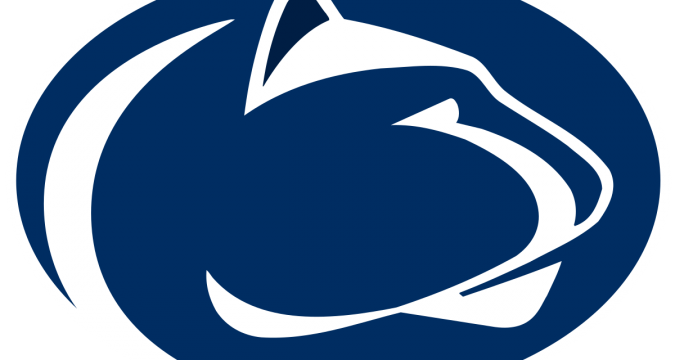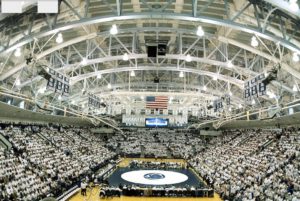
Courtesy of John Harrison
Dave is one of a select group of individuals who have been inducted into the GTE-CoSIDA Academic All-America Hall of Fame (Dave is pictured at right along with Penn State football coach Joe Paterno at Dave’s induction). GTE and CoSIDA have chosen “those with the highest standards in college academics, athletics and in life beyond athletics to honor as inductees into the GTE Academic All-America Hall of Fame.” Dave wrestled at Penn State from 1968-1972. He was a team captain, a three-time Eastern Intercollegiate Champion (1970, 1971,1972), an East-West National All-Star Meet winner in 1971 and a runner-up in the 1971 NCAA National Championships. He also was a team captain for the football team and a consensus All-American in 1971 in addition to being a standout student.
Some of Dave’s academic awards and honorary society memberships:
- Dean’s List student
- Academic All-American Football Team
- Recipient of NCAA PostGraduate Acadmic Scholarship
- Recipient of National Football Foundation and Hall of Fame Academic Scholarship
- Finalist for Eric A. Walker Award (outstanding Senior Student)
- Phi Eta Sigma (National Freshman Honor Society)
- Alpha Epsilon Delta (National Pre-Med Honor Society)
- Blue Key (Junior Men’s Honor Society)
- Skull and Bones (Senior Men’s Honor Society)
- Omicron Delta Kappa (National Leadership Honor Society)
Dave has continued his high acheivement level since graduating from Penn State. He graduated from the Milton S. Hershey Medical School in 1976. While a medical student he was class treasurer, was appointed by the President of the University to the University Disciplinary Review Board and was recepient of the Gilbert Nurick Award for outstanding academic achievement and service to the College of Medicine. He is now a very successful physican practicing orthopedic medicine. He also has remained active in athletics; he completed several marathons including the New York City Marathon and is a fifth degree Black Belt instructor in Manasyu and Kendo karate. He is also director of the World Kum-do (Japanese Sword) Association.
Dave is a member of the All-Time Nittany Lion (Penn State) Football Team and he received the Outstanding Football Alumnus Award from the Penn State University Quarterback Club in 1985. He was inducted into the GTE-CoSIDA Academic All America Hall of Fame, named as a Penn State University Distinguished Alumnus (1992), awarded the Penn State Wrestling Club’s Distinguished Alumnus Award (1993) and inducted into the Pennsylvania Sports Hall of Fame (1994) and the Pennsylvania Wrestling Hall of Fame (1993). He was Head Physician for the 1992 U.S. Winter Olympic Team and serves as Chairman of the U.S. Olympic Sports Medicine Committee. Dave also founded his own Sportsmedicine Institute and serves as an orthopedic surgeon at three Pennsylvania hospitals.
I was an assistant coach for the team through Dave’s career here. He was one of the most mentally tough people that I’ve ever been around. He also had great focus and intensity and a fantastic work ethic. Unfortunately, he was always working at a disadvantage in that he never had a full season. We usually didn’t get him until January because of his football commitments. The NCAA Tournament was in early March, so this didn’t leave Dave much time to get his conditioning and timing down. One year, however, he was able to start practice with us in December; that was the year Penn State didn’t go to a bowl game (1970). As soon as football ended he came right out and hit the mats. He also ran up and down Mt. Nittany everyday. That year he went all the way to the National finals, where he barely lost. That was his junior year and his senior year he had an especially short season as Penn State not only went to a bowl game, but Dave was selected to play in the Hula Bowl (all-star game) after that. It was just too short of a season. He still made it to the National quarterfinals, however.
-former PSU wrestler and head coach, Rich Lorenzo
Dave, how did you get started in wrestling?
I was in junior high school, kind of big and a reasonably good football player. My father thought that perhaps it would be good to try. Homer Barr (former Penn State wrestler) was the coach at State College (Pa.) High School. State College had a very successful wrestling program, so we thought that it would be an excellent winter sport for me. I didn’t get started until eighth grade but once I did, I was very much smitten for the rest of my career on the values and importance of this wonderful sport.
What have you been doing recently?
Recently, I founded Joyner Sportsmedicine Institute in 1992, which has since been acquired by NovaCare, Inc. in 1998. I am still serving as Chairman of the U.S. Olympic Sports Medicine Committee and am National Director of Sports Medicine for NovaCare, Inc. as well as continuing to see and treat patients in my orthopedic practice at the Orthopedic Institute of Pennsylvania.
What are your best memories from the years you spent as a Penn State wrestler?
My best memories from Penn State are: the wonderful fans and the crowds at Rec Hall where we wrestled, my friendships with my coaches and teammates, and my continued friendship with Coach Rich Loreenzo in the years past. Ira Lubert and I have remained great friends even with our competitiveness on the mat at Penn State. The relationship that Ira and I were able to generate even through hotly contested matches at heavyweight is probably one of my fondest memories of Penn State and my athletic and undergraduate career. Probably the greatest memory is the fact that Ira and I had to eliminate in the main gym sometimes, because they couldn’t get all the people that wanted to watch our eliminations in the wrestling room.
Not only did we have one of the best heavyweights in the country in Dave, but the second or third best heavyweight in the country was also on the team–Ira Lubert. When Dave was involved with football, Ira was wrestling at heavyweight and when Dave came back from football those two would go at it. Dave and Ira had incredible tryouts; one lasted 28 minutes–a seven minute regulation followed by seven overtime periods of three minutes each. These two guys made each other better. Some of the best heavyweight bouts in the country were between Dave and Ira.
-RL
How has the Penn State wrestling experience impacted your life/career?
My wrestling experience has impacted my life and career by giving me the tools to succeed in life. Those tools are ones that aren’t glamorous but are the most important. They include perseverance and hard work, the development of relationships on the wrestling mat and learning to live with those relationships and make them positive were also very important.
Do you still follow wrestling?
I follow Penn State wrestling as well as wrestling throughout the country through numerous publications as well as watching matches when I can.
How has collegiate wrestling changed since you were a wrestler at Penn State?
I think collegiate wrestling has changed because of the de-emphasis of mat wrestling. I think wrestling on your feet is emphasized much more now. This makes us probably more competitive in the Olympics but I find mat wrestling to be equally as exciting (perhaps because I come from the old school).
Dave, what advice do you have for collegiate wrestlers today?
Don’t try to do it all at once. Know the importance of conditioning and hard work that it takes to become what you want to be. You may have alot of talent but if you don’t really make the committment inside, you aren’t going to achieve your goals. The only person who can drive you enough to achieve your goals is yourself. Your coaches can tell you what to do, but even if you do it, but don’t do it to the fullest of your ability, you won’t achieve to your ability level.
Thanks Dave!

